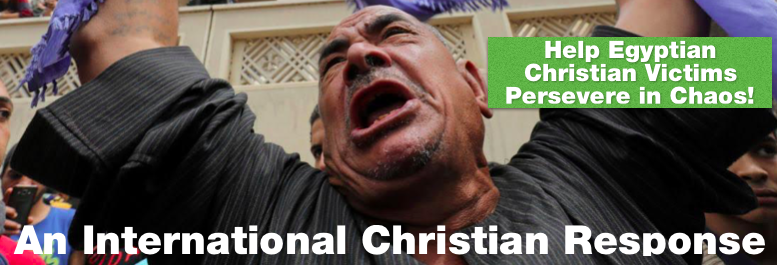a. for God’s comfort for those who lost loved ones and for full recovery of the injured
b. for comfort and encouragement for the wider Christian community and for God’s protection over his church in Egypt and over other targets of these kinds of attacks
c. that the perpetrators of these violent attacks and the instigators behind them will be found and brought to justice.
Blasts in Tanta and Alexandria kill at least 44 people. By the Editor
April 9, 2017, (Morning Star News) – Bomb attacks on two Coptic churches holding Palm Sunday services in Egypt today killed at least 44 people and injured more than 100 others, according to reports.
The first bomb exploded in the Nile Delta city of Tanta, at St. George’s Coptic Orthodox Church about 60 miles north of Cairo, killing at least 27 people and wounding 78 others, according to wire reports. Hours later, a suicide bomber was stopped at the door of St. Mark’s Coptic Orthodox Cathedral in the coastal city of Alexandria, where he detonated explosives that reportedly killed at least 17 people and injured 48 others. Islamic State (IS) claimed responsibility for the attacks.
The head of the Coptic Church, Pope Tawadros II, was at the service in Alexandria and had finished addressing the congregation before the blast, according to reports. He was unhurt. Pope Francis is scheduled to visit Egypt this month.
“These acts will not harm the unity and cohesion of the people,” Pope Tawadros later said through state media.
Security forces reportedly also dismantled two explosive devices at Sidi Abdel Rahim Mosque in Tanta.
The bombings were the latest in a series of assaults on Christians in Egypt, who make up about 10 percent of the population. A bombing in the suburbs of Cairo at the Church of St. Peter and St. Paul, also known as the Al Boutrosya Chapel, on Dec. 11 killed at least 25 people and wounded at least 49. The chapel is next to the St. Mark’s Coptic Orthodox Cathedral, which is held by many as the spiritual center of the Coptic Orthodox Church.
The bombing was followed by a series of murders of Coptic Christians, with IS issuing threats on a Feb. 19 video promising to rid the country of “idolaters.” Seven Copts were killed in one month.
On Feb. 23 militants reportedly stormed into the Al-Arish home of Kamel Youssef, then shot and killed him in front of his family. Two days earlier, the body of Saied Hakim, 65, was found Feb. 21 late at night in Al-Arish behind a state-run language school, where he was ambushed by masked gunmen. Hakim was shot in the head several times.
Medhat Saied, 45, Hakim’s son, was abducted and burned alive, his body found in the same place as his father’s, according to local media reports. No one has claimed responsibility for the three killings, but the consensus is that “Wilayat Sinai,” the Sinai Province branch of the Islamic State previously known as Ansar Bait al-Maqdis, killed the men in a quest to terrorize Christians and push them out of the region.
The Feb. 19 video features a recording of the suicide statement of jihadi Abu-Abdullah al-Masri, also known as Mahmoud Shafiq, 22, suspected in the December bombing of the Al Boutrosya Church. The IS speaker said the attack was “only the first.”
“There will be more operations in the near future, if God wills it, as you are our first target and our preferred target in our war,” he said. “You followers of the Cross, you traitors of all ties – know that warriors of the Islamic State are watching you, and our blessed invasion won’t be our last on you. Because what’s coming is worse and hotter than boiling oil, so wait and see, we will be victorious.”
Since Egypt’s 2013 coup, the military-run government has been involved in counter-insurgency operations in the Sinai against members of both the Muslim Brotherhood and Salafi groups now fighting under the banner of the Islamic State. Military outposts in the Sinai have been the sites of repeated attacks by terrorist groups.
The Egyptian army has had little success making strategic counter attacks or effectively protecting members of the Coptic minority constantly under assault.
On Jan. 30, Wa’el Youssef, 35, was shot down at his small grocery store in downtown Al-Arish. The assailants reportedly shot Youssef in broad daylight in front of his wife and one of their two sons. On Feb. 12, masked militants ambushed another Copt, Bahgat Zakher, 40, as he was driving his car through the southern outskirts of Al-Arish. A group of armed jihadis stopped Zakher then shot him in the head, neck and stomach, killing him instantly, according to local media reports.
Another Copt to meet his death at the hands of suspected jihadists in Al-Arish was Adel Shawqy, 57, a day laborer, who was shot in the head on Feb. 13.
On Feb. 16, masked men shot Gamal Girgis, 45, a Coptic schoolteacher and shoe shop owner. They ambushed Girgis while he was tending his shop. He was shot in the head and chest and died instantly, according to local media reports. The attack happened no more than 200 meters (220 yards) from a heavily defended army post.


